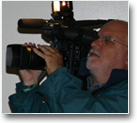
 |
  Trent University Announces New Canada Research Chair in Physics of BiomaterialsFOR IMMEDIATE RELEASE Dr. Aaron Slepkov Receives $500,000 for groundbreaking research while developing state-of-the-art imaging facility Wednesday, October 12, 2011, Peterborough Dr. Aaron Slepkov has been appointed the new Canada Research Chair in Physics of Biomaterials at Trent University, among the chairs announced today by the Honourable Gary Goodyear, minister of State (Science and Technology), including the renewal of Dr. Julian Aherne as the Canada Research Chair in Environmental Modeling at Trent University. As the renewed Canada Research Chair in Environmental Modeling, Professor Aherne will receive $500,000 over five years for his research using computer models to improve our understanding of pollutants in the environment. This research will lead to improved understanding of what pollutants will do in the future and to better management of ecosystem services. For more information, please visit www.trentu.ca/research. As the new Canada Research Chair in Physics of Biomaterials, Professor Slepkov will receive $500,000 over five years for his development and use of state-of-the-art microscopy techniques that will allow for rapid three-dimensional imaging of the structure and dynamics of biomaterials, vital for biomedicine and advanced materials science, while opening up new applications of the technology in other fields. Biomaterials are natural or synthetic materials that are increasingly being used in medical devices or to supplement or replace living tissues. Prof. Slepkov is aiming to probe deeper into biomaterials than ever before, to study closely their physical, chemical, and biological properties, using ultrafast laser microscopy to “fingerprint” different chemicals, making it possible to simultaneously view the structure and chemical composition of biomaterials such as fats, starch, cellulose, bone, cells, and tissues. The five-year funding will enable the building of a state-of-the art imaging facility at Trent, with equipment being built by the students themselves under Prof. Slepkov’s guidance. “This is a great opportunity for undergraduate and graduate students to be involved in building lasers and microscopes, and to experiment with these tools to characterize organic molecules and biomaterials,” said Prof. Slepkov. Prof. Slepkov believes that Trent’s interdisciplinary thrust will not only make the most efficient use of the new technology, but will also open up new applications for it that have not yet been considered, in particular by Trent’s Biomaterials research program and even beyond. “There are so many different ways in which this kind of technique can be applied outside of the field of bio-medicine: in material science, in geosciences, or even in paleobiology. If we’re looking 15 years down the road, I believe it will find a permanent niche in many of these areas. Trent University’s dedication to transformative interdisciplinary research makes it an exciting place for conducting this type of research,” said Prof. Slepkov. “By using new imaging techniques to go beyond what has been seen before, Dr. Slepkov’s research will add to Trent’s growing reputation for teaching and research excellence in Biomaterials,” said Dr. Neil Emery, vice-president Research & International at Trent University. Innovation has been the central theme of Dr. Aaron Slepkov’s post-graduate work over the past five years, from the cutting-edge photonics research he was engaged in during his postdoctoral work at Cornell University, to the applied work he did at the National Research Council (NRC) with state-of-the-art imaging technology. This focus on the practical application of research is an approach Prof. Slepkov intends to bring to his work at Trent University. Trent University’s proportionate number of Canada Research Chairs is exceptionally large for a University of its size. Trent’s 10 chair holders advance teaching and learning through their leading edge explorations in diverse disciplines:
“Our government is investing in the people and ideas that will keep Canada at the forefront of the global economy,” said Minister Goodyear. “The Canada Research Chairs are helping to develop, attract and retain the world’s top researchers here in our country.” The Canada Research Chairs Program is designed to attract and retain the best talent from Canada and around the world, helping Canadian universities achieve research excellence in health sciences, natural sciences and engineering, and social sciences and humanities. Since the program was launched in 2000, chair holders have improved Canadians’ depth of knowledge and quality of life, strengthened the country’s international competitiveness, and helped train the next generation of highly skilled people. -30- For more information, please contact: Dr. Aaron Slepkov, 705-748-1011 x6216, aaronslepkov@trentu.ca |
































